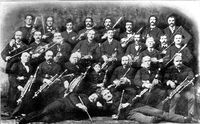Annotation:Monday Morning (2)
Back to Monday Morning (2)
MONDAY MORNING [2] (Maidin Dia Luain). AKA and see "Lady Forbes," "Lady Harriet Hope," "Miss MacDonald (2)," "Victory (2)." Irish, Reel. G Major. Standard tuning (fiddle). AAB.

Source for notated version: "Dillon" [O'Neill]. Chicago policeman and fiddler Timothy M. Dillon was a contributor to the O'Neill collections, and received a sketch in Irish Minstrels and Musicians (1913, p. 395):
When it comes to traditional fiddle-playing in its most cultured sense, no one displays such marked individuality as Timothy M. Dillon of the Chicago police force. While not a few others of our acquaintance leave little or nothing to be desired in the way of rhythm, graces, and execution, the plaintive, pleading, haunting tomes which Officer Dillon produces on his instrument are indescribably weird and wailing even in his reveling reels.
Many a pleasant hour has the present writer enjoyed listening to this wizard of the violin, and wondering how such peculiarly quaint music was produced. Notwithstanding the luxuriance of his turns, rills, and triplets, we noticed that his finger tips slid slightly from the stops with much frequency, thereby shading the tones in a most expressive way. This style of execution is practiced to a limited extent by capable violinists in playing airs. None but an expert who had acquired the art in early life--and Dillon had--would attempt it in the rapid passages of Irish dance music.
Born in the Parish of Rathea a few miles from Newmarket West, County Limerick, the subject of this sketch commenced the study of the violin in 1855, when but nine years old, under the tuition of Patrick O'Grady, and in a few years was ranked with the best of them. Old customs and usages had not yet been placed under the ban, so that young Dillon's practice in dancing kept pace with his progress in music, and many are the contests he won among the disciples of Terpsichore in his native county before heading for the "land of the free."
A genial, kindly gentleman in pubic and private life, he has never been afflicted with temperament, and is therefore at peace with the world; able and willing to entertain all comers with music and true Irish hospitality.
Printed sources: O'Neill (Krassen), 1976; p. 156. O'Neill (Music of Ireland: 1850 Melodies), 1903; No. 1525, p. 282.
Recorded sources:
